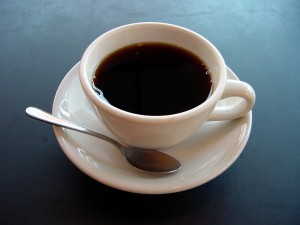Most weekday mornings you can find a group of folks gathered at the Leamington Mennonite Heritage Centre. The group shares coffee, tea, and treats, along with friendship, memories, and stories. Everyone is welcome.
 At my last coffee time (September 1st, 2015), the group taught me some phrases related to eating. Special thanks go to John Dick, Helen Fehr, Helga Harder, Elfrieda Neufeld, Bruno Penner, Freda Penner, and Jake Wiens for teaching! Although I have German heritage via my father’s father, I can’t say much more than guten Tag (and I’m not sure I spelled that correctly). Some of what follows is High German and some is Low German. Please note that Low German is primarily a spoken language and there was quite a bit of discussion about the spelling of these words and phrases since there is no standardized written language. Please also keep in mind this is not a linguistics website and I am not a native or educated speaker of either of these languages. There are probably mistakes below. That said, I welcome your comments and corrections!
At my last coffee time (September 1st, 2015), the group taught me some phrases related to eating. Special thanks go to John Dick, Helen Fehr, Helga Harder, Elfrieda Neufeld, Bruno Penner, Freda Penner, and Jake Wiens for teaching! Although I have German heritage via my father’s father, I can’t say much more than guten Tag (and I’m not sure I spelled that correctly). Some of what follows is High German and some is Low German. Please note that Low German is primarily a spoken language and there was quite a bit of discussion about the spelling of these words and phrases since there is no standardized written language. Please also keep in mind this is not a linguistics website and I am not a native or educated speaker of either of these languages. There are probably mistakes below. That said, I welcome your comments and corrections!
On to the language lesson:
Key:
HG = High German
LG = Low German
If you want to know if your guest is enjoying their food:
(HG) Does it schmeks? — Does it taste good?
(HG) Schmeks gut? — Taste good?
(HG) Sehr gut — Very good!
If you’re just having a small drink, this one is for you — although there was discussion whether to measure this as a sip, more than a sip, a swallow, or a quarter cup. It was noted that this kind of swallow is distinct from the bird swallow:
(HG) ein Schluck — a swallow (see above)
If you want to be polite when you ask for something, you’d say:
(HG) bitte — please
To ask for more please:
(HG) mehr bitte — more please, for example, if you want more in your cup
If you wanted your guests to know it was okay to have another helping, that is, that you weren’t in a rush to clear the table, you might say:
(LG) Et yoont saut — no rush, take your time
Two useful phrases that came up (one hopefully unrelated to what you’re eating, and one that you might say to the person who prepared the meal):
(HG) ich bin krank — I am ill
(HG) ich liebe dich — I love you
I’m not sure how phrases about eating turned into insults, but that’s what came next; one member of the group was clear that growing up in their house, they were not allowed to speak this way. These phrases are extremely colloquial, i.e. gutter talk. If this language offends, you might prefer to skip this part:
(LG) shoup’s kop –– sheep head, dough head. Someone not clever
(LG) duzzle — crude word for a dummy or totally confused person who is doing everything backwards
(LG) ol knuks — old geezer
(LG) ferecht — crazy
(LG) dwautz — stupid
From there we touched on some animal phrases:
(LG) ole/ola schrug — old horse (ole for male; ola for female)
(LG) ole/ola tchlemp — old cow (ole for male; ola for female)
(LG) De tchelmp es veracht. — The cow has died.
(LG) De ferechte tchlemp es veracht. — The crazy cow has died.
The last phrase above highlights the similarity between the words ferechte (crazy) and veracht . Again, this is colloquial speech.
Coffee time is by donation every weekday morning at the Leamington Mennonite Heritage Centre at 31 Pickwick Ave, Leamington, Ontario Canada. See you next time!
